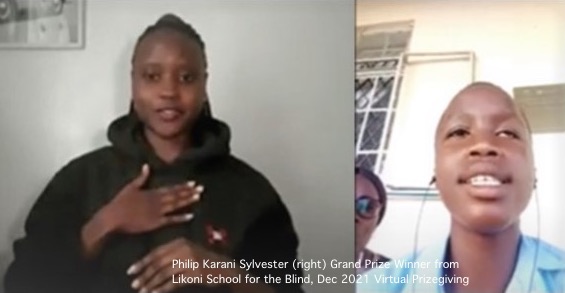eKitabu: Creating Accessible Digital Content for Remote Learning
Based in Kenya, eKitabu provides accessible digital content, software, and programs for inclusive and equitable quality education. In 2020, the APIF selected eKitabu from 311 applications across 26 African countries to tackle Africa’s remote learning challenges. eKitabu’s project is a public-private collaboration that works with the International Publishers Association (IPA) and the Kenya Publishers Association (KPA) to creatively address the learning challenges that have taken centre stage for the world during the COVID-19 pandemic.
Learner engagement
 eKitabu engages with learners through programs that build a reading and writing culture, something that aligns closely to the aims of APIF. In 2021, eKitabu engaged learners in an inclusive Digital Essay Competition (DEC) to celebrate budding writers in primary and secondary schools across a variety of languages, including girls and boys with and without disabilities in all parts of Kenya. The topic for this year was: What are the hardest and best experiences you have had during the COVID-19 pandemic? The Competition had over 13,000 submissions, and the prize giving event was held via Zoom, on 2 December 2021.
eKitabu engages with learners through programs that build a reading and writing culture, something that aligns closely to the aims of APIF. In 2021, eKitabu engaged learners in an inclusive Digital Essay Competition (DEC) to celebrate budding writers in primary and secondary schools across a variety of languages, including girls and boys with and without disabilities in all parts of Kenya. The topic for this year was: What are the hardest and best experiences you have had during the COVID-19 pandemic? The Competition had over 13,000 submissions, and the prize giving event was held via Zoom, on 2 December 2021.
Publisher engagement
eKitabu also conducted a Content Development Challenge (CDC) with Kenya’s publishers. The challenge incentivized publishers to adopt inclusive publishing practices, building accessibility into their works, to widen access to reading and learning for all people, leaving no one behind. Over 45 content creators from Kenyan publishing firms participated in the program, which recognizes and rewards quality accessible digital content created by publishers. Prizes include cash, certificates, and public recognition of excellence by members of the Kenyan government. Central to CDC is the use of low-cost, practical tools and templates in eKitabu’s open-source, Accessible EPUB Toolkit. To date, eKitabu has received 48 new titles from the publishers and the prizegiving will be held in early 2022. This program puts local publishers at the centre of a sustainable education ecosystem.

Driving content utilization
In this program, eKitabu distributed accessible digital content from Kenyan publishers to schools in a proof of concept for digital learning. Through eKitabu’s Android and Windows apps, learners access approved curriculum content on their devices. A key piece of the puzzle was training teachers in the utilization of the accessible digital content.
eKitabu focused on empowering teachers with skills in Universal Design for Learning (UDL) and how to utilize ICT in the classroom. UDL is a framework that focuses on removing learning barriers for all children, and sees such barriers as being in the system, not in the learner. eKitabu implemented the training in three cohorts and trained 79 teachers from mainstream and special needs schools.
 UDL guides the development of flexible learning environments and learning spaces that can accommodate individual learning needs, styles, and differences. As a framework, UDL utilizes multiple approaches to engage learners in the process of learning.
UDL guides the development of flexible learning environments and learning spaces that can accommodate individual learning needs, styles, and differences. As a framework, UDL utilizes multiple approaches to engage learners in the process of learning.
Ruth Samoei, a teacher from Kapkoros Family Primary School, in Uasin Gishu, said: ‘I am happy that I attended the teacher training sessions and learned that an inclusive school is where we have all learners of various abilities learning together in the same classroom.
About eKitabu
Since it was founded in 2012, eKitabu has brought digital content to over 3,000 schools across 14 African countries and all 47 counties of Kenya. eKitabu delivers accessible digital content for inclusive and quality education. The educational impact of books is eKitabu’s foundation and on that proven foundation eKitabu innovates, designing with users and collaborators across the public and private sector, to increase accessibility and lower the cost of inclusive and equitable quality education, leaving no one behind.